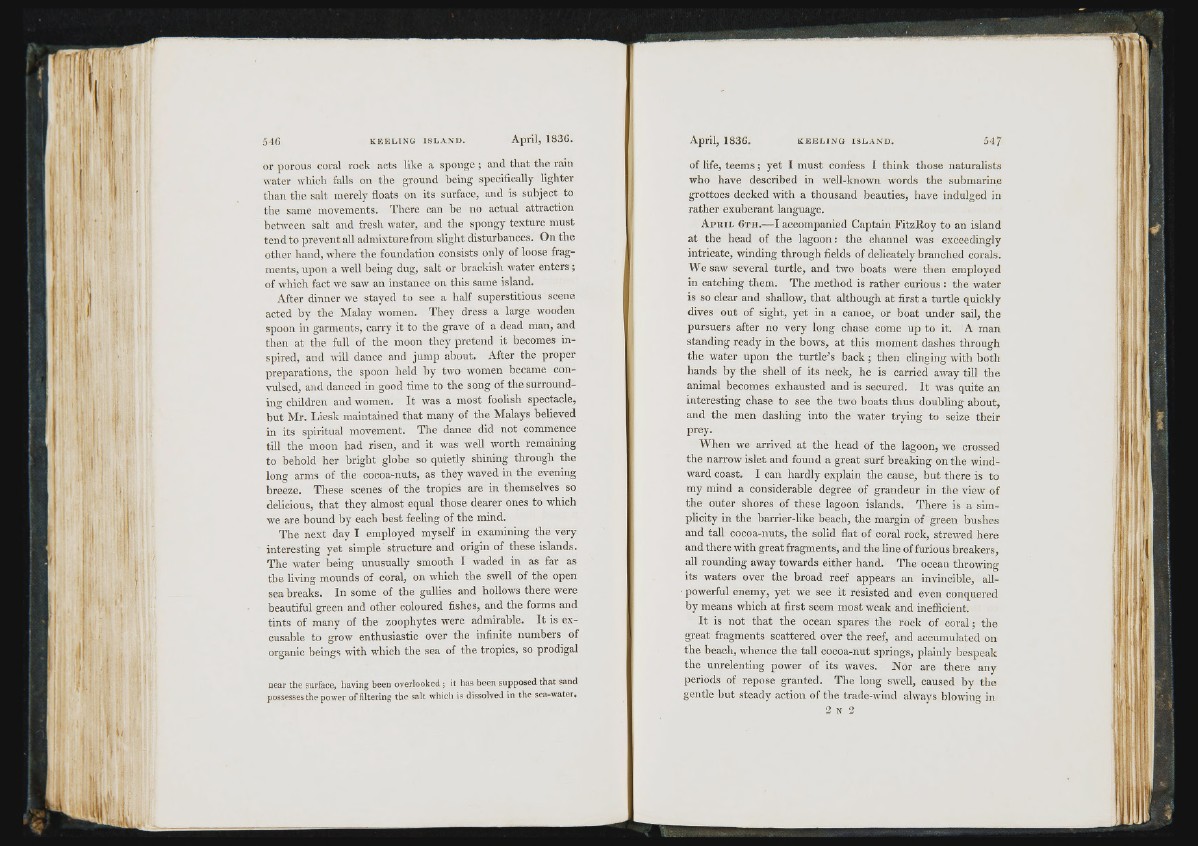
or porous coral rock acts like a sponge ; and that the rain
water which falls on the ground being specifically lighter
than the salt merely floats on its surface, and is subject to
the same movements. There can be no actual attraction
between salt and fresh water, and the spongy texture must
tend to prevent all admixture from slight disturbances. On the
other hand, where the foundation consists only of loose fragments,
upon a well being dug, salt or brackish water enters;
of which fact we saw an instance on this same island.
After dinner we stayed to see a half superstitious scene
acted by the Malay women. They dress a large wooden
spoon in garments, carry it to the grave of a dead man, and
then at the full of the moon they pretend it becomes inspired,
and will dance and jump about. After the proper
preparations, the spoon held hy two women became convulsed,
aud danced in good time to the song of the surrounding
children and women. It was a most foolish spectacle,
but Mr. I.iesk maintained that many of the Malays believed
in its spiritual movement. The dance did not commence
till the moon had risen, and it was well worth remaining
to behold her bright globe so quietly shining through the
long arms of the cocoa-nuts, as they waved in the evening
breeze. These scenes of the tropics are in themselves so
delicious, that they almost equal those dearer ones to which
we are bound by each best feehng of the mind.
The next day I employed myself in examining the very
interesting yet simple structure and origin of these islands.
The water being unusually smooth I waded in as far as
tbe hving mounds of coral, on which the swell of the open
sea breaks. In some of the gullies and hollows there were
beautiful green and other coloured fishes, and the forms and
tints of many of the zoophytes were admirable. It is excusable
to grow enthusiastic over the infinite numbers of
organic beings with which the sea of the O c> tropics, so prodigal
n e a r th e su rface, h av in g b e e n o v e rlo o k e d ; it has b e e n su p p o s e d t h a t san d
possesses th e p ow e r o f filte rin g th e s a lt which is disso lv ed in th e se a -w a te r.
of life, teems; yet I must confess I think those naturalists
who have described in well-known words the submarine
grottoes decked with a thousand beauties, have indulged in
rather exuberant language.
A p r i l 6t h .— I accompanied Captain FitzRoy to an island
at the head of the lagoon: the channel was exceedingly
intricate, winding through fields of delicately branched corals.
We saw several turtle, and two boats were then employed
in catching them. The method is rather curious: the water
is so clear and shallow, that although at first a turtle quickly
dives out of sight, yet in a canoe, or boat under sail, the
pursuers after no very long chase come up to it. A man
standing ready in the bows, at this moment dashes through
the water upon the turtle’s back; then clinging with both
hands by the shell of its neck, he is carried away till the
animal becomes exhausted and is secured. It was quite an
interesting chase to see the two boats thus douliling about,
and the men dashing into the water trying to seize their
prey.
When we arrived at the head of the lagoon, we crossed
the narrow islet and found a great surf breaking on the windward
coast. I can hardly explain the cause, but there is to
my mind a considerable degree of grandeur in the view of
the outer shores of these lagoon islands. There is a simplicity
in the barrier-like beach, the margin of green bushes
and tall cocoa-nuts, the solid flat of coral rock, strewed here
and there with great fragments, and the line of furious breakers,
all rounding away towards either hand. The ocean throwing
its waters over the broad reef appears an invincible, all-
powerful enemy, yet we see it resisted and even conquered
by means which at first seem most weak and inefficient.
It is not that the ocean spares the rock of coral; the
great fragments scattered over the reef, and accumulated on
the beach, whence the tall cocoa-nut springs, plainly bespeak
the unrelenting power of its waves. Nor are there any
periods of repose granted. The long swell, caused by the
gentle but steady action of the trade-wind always blowing in
2 N 2